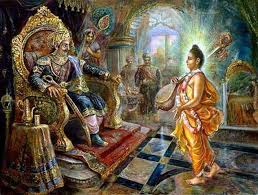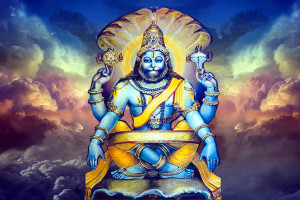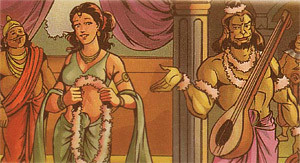Introduction
The story of the cursing and subsequent deliverance of Nalakuvara and Manigriva by Lord Krsna, orchestrated under the compassionate desire of the great sage Narada, serves as a profound lesson in humility, devotion, and the mercy of the divine.
The Downfall of Nalakuvara and Manigriva
Nalakuvara and Manigriva were the sons of Kuvera, the treasurer of the demigods and a great devotee of Lord Siva. Blessed with immense material opulence, they became indulgent in wine and women, losing sight of their spiritual duties. One day, intoxicated and engaged in frivolous activities with young women in the Mandakini Ganges, they were seen by Sage Narada. While the women, embarrassed, covered themselves, the two demigods remained oblivious to Narada’s presence.
Narada’s Curse and Compassion
Narada, moved by compassion, decided to free them from their debauchery and ignorance. He cursed them to become trees, symbolizing their rooted attachment to material pleasures. However, this curse was also a blessing. Narada granted them the opportunity to see Lord Krsna face to face after a hundred years of demigod time, after which they would be liberated from their plight.
Narada’s curse aimed to teach that excessive attachment to material opulence leads to moral degradation and ignorance of life’s ultimate purpose. Through this act, Narada intended to direct them towards spiritual awakening and devotion.
The Essence of Narada’s Teachings
Narada explained that material wealth often leads to arrogance and a sense of false pride. Those intoxicated by wealth and power tend to forget the ephemeral nature of the body and the inevitability of death. He emphasized the importance of understanding the true owner of the body, which ultimately belongs to material nature and not to the self. Recognizing this helps one refrain from sinful actions committed in the pursuit of maintaining the body.
Narada further elaborated on the virtues of poverty, which can keep a person humble and open to spiritual growth. Poverty-stricken individuals often empathize with others’ suffering and are more likely to seek spiritual association, which is crucial for liberation.
Krsna Fulfills Narada’s Words
Years later, Lord Krsna, bound to a wooden mortar by His mother Yasoda, crawled towards the twin Arjuna trees (Nalakuvara and Manigriva). In fulfillment of Narada’s prophecy, Krsna uprooted the trees, liberating the two demigods. They emerged in their divine forms, radiant and grateful, and offered heartfelt prayers to Krsna, acknowledging His supreme position and expressing their devotion.
They praised Krsna as the Supreme Personality of Godhead, the source of all creation, and the master of all mystic powers. They recognized His transcendental nature, beyond the influence of material modes, and expressed their desire to remain eternally engaged in His loving service.
Lessons to Be Learned
- Humility and Devotion: True spiritual progress requires humility and surrender to the divine, free from the arrogance that often accompanies material wealth.
- The Role of a Spiritual Master: The guidance of a saintly person, like Narada, is essential in redirecting one’s life towards spiritual realization.
- Mercy of the Divine: The story illustrates the boundless mercy of Lord Krsna and His devotees, who work tirelessly to liberate souls from material bondage.
- Value of Poverty: Material poverty can be a catalyst for spiritual growth, fostering empathy, humility, and a greater receptivity to spiritual teachings.
Related Quotes
Srimad Bhagavatam
- SB 1.2.6: “The supreme occupation (dharma) for all humanity is that by which men can attain to loving devotional service unto the transcendent Lord. Such devotional service must be unmotivated and uninterrupted to completely satisfy the self.”
- SB 4.31.22: “As pouring water on the root of a tree energizes the trunk, branches, twigs, and everything else, and as supplying food to the stomach enlivens the senses and limbs of the body, simply worshiping the Supreme Personality of Godhead through devotional service automatically satisfies the demigods, who are parts of that Supreme Personality.”
Caitanya Caritamrita
- CC Adi 1.56: “The Supreme Personality of Godhead, Krsna, is the fountainhead of all incarnations. Lord Balarama is His second body.”
- CC Madhya 22.62: “‘By associating with worldly people, one becomes devoid of truthfulness, cleanliness, mercy, gravity, spiritual intelligence, shyness, austerity, fame, forgiveness, control of the mind, control of the senses, fortune and all opportunities.”
Srila Prabhupada’s Writings
- Bhagavad-gita As It Is 9.22: “But those who always worship Me with exclusive devotion, meditating on My transcendental form—to them I carry what they lack, and I preserve what they have.”
- Nectar of Devotion: “Devotional service is the unique and natural way to gain the blessings and protection of the Lord. By sincerely worshiping and dedicating oneself to Him, one is freed from all material troubles.”
Prayer to Lord Krsna for Mercy
Prayer for Deliverance and Mercy
Om Namo Bhagavate Vasudevaya
“O Lord Krsna, Supreme Personality of Godhead, I seek Your divine mercy. Just as You liberated Nalakuvara and Manigriva from their fallen state, kindly deliver me from the bondage of material existence. Grant me the strength to remain humble, devoted, and always engaged in Your loving service. May my life be dedicated to glorifying Your holy names and pastimes. Jai Sri Krsna!”
Conclusion
The story of Nalakuvara and Manigriva is a profound reminder of the perils of material opulence and the redeeming power of divine mercy. It underscores the importance of humility, the guidance of saintly persons, and unwavering devotion to the Supreme Lord as the path to ultimate liberation.



